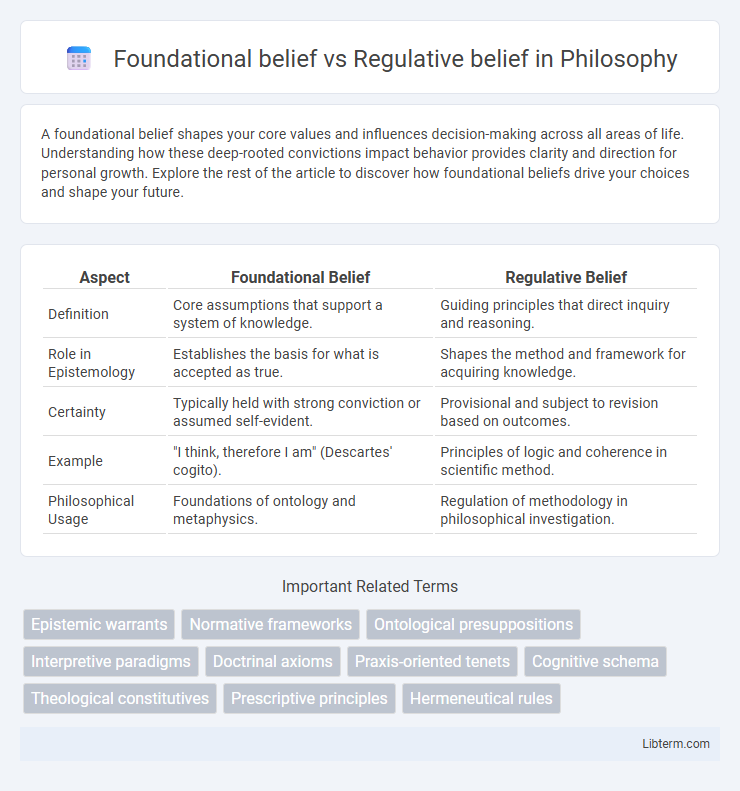A foundational belief shapes your core values and influences decision-making across all areas of life. Understanding how these deep-rooted convictions impact behavior provides clarity and direction for personal growth. Explore the rest of the article to discover how foundational beliefs drive your choices and shape your future.
Table of Comparison
| Aspect | Foundational Belief | Regulative Belief |
|---|---|---|
| Definition | Core assumptions that support a system of knowledge. | Guiding principles that direct inquiry and reasoning. |
| Role in Epistemology | Establishes the basis for what is accepted as true. | Shapes the method and framework for acquiring knowledge. |
| Certainty | Typically held with strong conviction or assumed self-evident. | Provisional and subject to revision based on outcomes. |
| Example | "I think, therefore I am" (Descartes' cogito). | Principles of logic and coherence in scientific method. |
| Philosophical Usage | Foundations of ontology and metaphysics. | Regulation of methodology in philosophical investigation. |
Understanding Foundational Beliefs
Foundational beliefs are core assumptions that form the basis for other beliefs and influence perception and reasoning, distinguishing them from regulative beliefs, which guide behavior and decision-making processes. Understanding foundational beliefs reveals how individuals construct their worldview and process information, impacting cognitive frameworks and emotional responses. Research in cognitive psychology emphasizes that altering foundational beliefs can lead to significant changes in attitudes and behaviors, illustrating their central role in personal and social identity formation.
What Are Regulative Beliefs?
Regulative beliefs guide behavior by prescribing how individuals should act in specific situations, shaping decision-making and social interactions. These beliefs influence everyday actions and strategies through norms, rules, and expectations, often rooted in cultural or institutional frameworks. Unlike foundational beliefs, which concern core perceptions about reality, regulative beliefs function as practical directives to regulate conduct and maintain social order.
Key Differences Between Foundational and Regulative Beliefs
Foundational beliefs serve as core, self-evident truths that underpin and justify other beliefs, while regulative beliefs guide behavior and decision-making without needing absolute proof. Foundational beliefs remain constant and form the basis of knowledge systems, whereas regulative beliefs are adaptable and often context-dependent to help manage actions and expectations. The key difference lies in their function: foundational beliefs establish epistemic certainty, whereas regulative beliefs provide practical frameworks for interaction and conduct.
Origins of Foundational and Regulative Beliefs
Foundational beliefs originate from basic, self-evident principles or direct experiences that form the epistemic groundwork for other beliefs. Regulative beliefs emerge from higher-order norms or objectives that guide the acquisition, evaluation, and revision of foundational and other subordinate beliefs. The distinction highlights foundational beliefs as epistemic bedrock, while regulative beliefs function as cognitive frameworks shaping belief systems' organization and coherence.
Role of Foundational Beliefs in Knowledge Systems
Foundational beliefs serve as the core assumptions or premises that underpin entire knowledge systems, providing the essential criteria for what is accepted as true or valid within a given framework. These beliefs shape epistemic justification by establishing the baseline from which regulative beliefs operate, guiding inquiry and interpretation without themselves requiring further justification. Understanding the role of foundational beliefs is crucial for analyzing how knowledge systems maintain coherence and resist skepticism.
Regulative Beliefs in Social and Ethical Contexts
Regulative beliefs function as guiding principles that shape ethical behavior and social interactions, influencing norms and standards within communities. These beliefs dictate how individuals should act to maintain social harmony and uphold moral values, often reinforced through cultural and religious institutions. In ethical contexts, regulative beliefs help establish accountability and foster trust, ensuring consistent conduct aligned with collective expectations.
How Foundational Beliefs Shape Worldviews
Foundational beliefs serve as core assumptions that shape an individual's worldview by establishing the basic framework for interpreting experiences and information. These beliefs influence the formation of regulative beliefs, which guide behavior and decision-making based on the foundational principles. Understanding how foundational beliefs operate is crucial for exploring cognitive schemas and cultural perspectives within social psychology and philosophy.
The Function of Regulative Beliefs in Daily Behavior
Regulative beliefs guide daily behavior by influencing how individuals interpret situations and make decisions, thereby shaping actions in a consistent and goal-directed manner. These beliefs function as practical rules or norms that regulate behavior to achieve desired outcomes, often operating subconsciously to maintain social harmony or personal well-being. Unlike foundational beliefs, which represent core truths or worldviews, regulative beliefs adjust responses to immediate contexts and external demands.
Interplay Between Foundational and Regulative Beliefs
Foundational beliefs serve as the core assumptions about reality and values that shape an individual's worldview, while regulative beliefs guide specific behaviors and decisions based on those foundational principles. The interplay between foundational and regulative beliefs creates a dynamic framework where deeply held convictions influence situational judgments, ensuring consistent and coherent responses to various experiences. Discrepancies between these belief types can prompt cognitive reevaluation, highlighting the importance of alignment for psychological stability and adaptive functioning.
Impact of Belief Types on Personal and Collective Decision-Making
Foundational beliefs serve as core principles that shape both personal identity and collective values, providing a stable framework for interpreting experiences and guiding long-term decisions. Regulative beliefs function as practical guidelines or norms that influence behavior and choices in specific contexts, directly impacting how individuals and groups respond to immediate challenges. The interplay between foundational and regulative beliefs determines the consistency and adaptability of decision-making processes within communities and organizations.
Foundational belief Infographic

 libterm.com
libterm.com